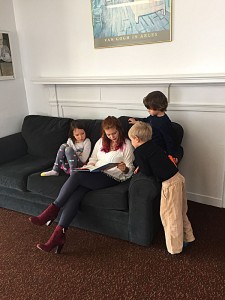 Reading for pleasure and knowledge has always been a meaningful part of my life. So when my three children started SVS at young ages I couldn’t help but wonder how they would learn to read without the direct instruction I had experienced as a child.
Reading for pleasure and knowledge has always been a meaningful part of my life. So when my three children started SVS at young ages I couldn’t help but wonder how they would learn to read without the direct instruction I had experienced as a child.
Now that my three are in double digit ages and reading what interests them, I have been reflecting on the varied paths their reading journeys have taken.
My first began reading out of the blue, before even starting SVS. No direct instruction, just books lying around the house, being read to now and then, and frustration here and there over not knowing what the words were at the bottom of his favorite video games. One day he picked up a book and just began reading the words with little hesitation. Now, 8 years into his SVS journey, he can be found with 1000-page sci-fi books, lounging around the house or escaping the family craziness by multitasking with a book and a TV show on at the same time. Or using a well-loved book falling apart as kindling for a camping fire!
My second child started SVS at age five displaying no signs of reading. At 10, she can now be found hiding under her blanket with a book light enjoying books stolen from her brother’s shelves or borrowed from SVS friends. Much of her reading also happens during computer games, recipes, license plates, coupons, and the app store game lists.
Much like her twin sister, my third child also started out not reading. Her reading developed over time too, but not as obviously as her siblings. Just as she preferred to sit and enjoy watching her sister do all of the walking during early toddlerhood, she has for the past couple years been fine with watching how others were getting into words and satisfying her own needs for knowing what a word was by asking someone around her. I admit that I had to fight my tendencies to want to use those moments as “teachable moments” and teach her methods of figuring out what a word was. Rather, I tried to just answer her question and trust that reading would come in its own time. She has had frustrations with being in a different place with reading than her sister or friends, pulling at my insecurities of the educational choices we had made. But then it began to seem as though the frustration may have been a driving force behind her developing reading skills that have now supported her interests in reading. The list of things to read is endless: books, comics and puzzles in the local newspaper, names of music she wants to steal from my iTunes collection, and most important of all, the signs put up at school announcing special events she can sign up for.
My favorite part of knowing they can now all read? The fact that they can no longer use the “but I can’t read” excuse in order to get out of doing their chores I type out and post on the microwave most days!
Note: This piece was originally posted March 23, 2015. It now includes an audio reading.

